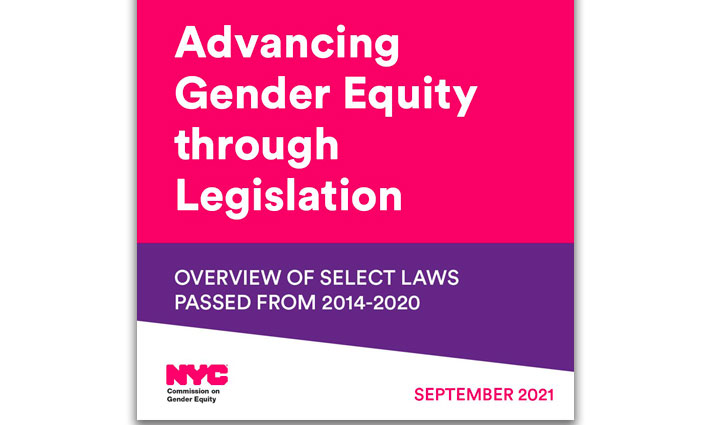
How New York City is Addressing the Needs of All Genders
Thursday, November 11, 2021 (New York, NY) – The unequal impact of the pandemic on women, particularly single mothers, brought to the surface what many have known for years; we do not have gender equity in the workplace.
A new study conducted by the Initiative for Gender Equity in the Public Sector at John Jay College of Criminal Justice (IGEPS) for the NYC Commission on Gender Equity looks at recent legislation passed in New York City and its attempt to balance the scales.
Advancing Gender Equity through Legislation: A Compilation of Laws passed from 2014 – 2020 examines three areas where women, transgender and non-binary workers are at traditional disadvantages to male counterparts; Economic Mobility and Opportunity, Health and Reproductive Justice, and Safety.
“This report is an important step in making the public aware of legislation that arguably positions New York City as a model municipality for gender equity,” said John Jay College Public Administration Professor Nicole M. Elias, Co-Founder and Co-Director of IGEPS. “Understanding the rapid gender equity progress made from 2014-2020 lays the foundation for future progress and ensures New Yorkers of all gender identities, gender expressions, and backgrounds have the right to live safe, healthy, and economically secure lives.”
“Our partnership with IGEPS helped CGE achieve one of its key goals—to ensure that New Yorkers can readily access information on the gender equity gains made since 2014,” said Jacqueline M. Ebanks, Executive Director of the Commission on Gender Equity. “We are grateful for the opportunity to work with the Dr. D’Agostino, Dr. Elias, and IGEPS’ team of indefatigable student researchers on this important publication.”
One key piece of legislation is a 2017 law requiring agencies designated by the Mayor to survey all persons served by the agency on their sexual orientation and gender identity. Each agency must collect sexual orientation and gender-identity demographic information and produce a report summarizing this information. This law also requires that the data collection process be reviewed regularly.
This legislation ensures sexual orientation and gender identity data will be collected for the first time. This data will provide the basis for understanding the challenges marginalized gendered populations face, which is a crucial first step to addressing the needs of all genders across New York City.
Another is the 2018 law that mandates a review of City agency forms and to update the way they collect gender pronoun information. Agencies like the Mayor’s Office of Operations, Department of Education, and Social Services now must review and potentially collect voluntary gender pronoun information from residents.
In addition, the current administration worked to amend the City Charter to create a permanent Commission on Gender Equity (CGE).
“This was a bold break from past Commissions that focused primarily on women and girls,” said John Jay Public Administration Professor Maria J. D’Agostino, Co-Founder and Co-Director of IGEPS. “Now CGE’s expanded scope includes girls, women, and transgender and gender non-conforming persons regardless of ability, age, ethnicity/race, faith, gender expression, immigrant status, sexual orientation, and socioeconomic status.”
Proposed legislation is now being considered by City Council that would take this a major step further, and establish an Office of Sexual Orientation and Gender Identity and Expression (SOGIE). That office would provide a centralized structure to improve gender equity across New York City by promoting City programs, community outreach and education for communities including lesbian, gay, bisexual, transgender, queer, questioning, intersex, asexual, nonbinary, and gender nonconforming.
About the Initiative for Gender Equity in the Public Sector:
The Initiative for Gender Equity in the Public Sector (IGEPS) conducts evidence-based research to make public service and public policy more equitable for all gender identities. IGEPS partner with public sector organizations to equip administrators with the best tools and resources to make informed decisions for achieving gender equity. Visit https://igeps.org/ and follow on Twitter @_IGEPS.
About John Jay College of Criminal Justice:
An international leader in educating for justice, John Jay College of Criminal Justice of the City University of New York is a Hispanic Serving Institution and Minority Serving Institution offering a rich liberal arts and professional studies curriculum to 15,000 undergraduate and graduate students from more than 135 nations. John Jay is home to faculty and research centers at the forefront of advancing criminal and social justice reform. In teaching, scholarship and research, the College engages the theme of justice and explores fundamental human desires for fairness, equality and the rule of law. For more information, visit www.jjay.cuny.edu and follow us on Twitter @JohnJayCollege.



